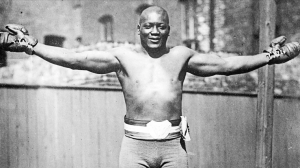They crowned Jack Johnson the first Black heavyweight champion in 1908, but the fight had just begun. The Black community was overjoyed, seeing Johnson’s title as a major step toward equality. Whites i

n America, however, were often near panic. Even the New York Times wrote that “thousands of his ignorant brothers will misinterpret [Johnson’s] victory as justifying claims to more than physical equality.”
Calls went out for a “Great White Hope” to step into the ring and take away the crown. Each Johnson fight was met equally with parades, celebrations, and race riots. Johnson was aware of his impact on history and Ame
rican culture. He kept the public’s eye through bravado and by never letting people forget that a Black man was the Champ. This larger-than-life persona is perhaps Johnson’s lasting legacy, frightening to whites
at the time, but today has inspired generations of African Americans.
More than a century later, Jack Johnson’s legacy – his rise to glory at the height of Jim Crow America continues on. James Earl Jones was nominated for an Oscar for his portrayal of Johnson in “The Great White Hope.” Miles Davis recorded his album, “Tribute to Jack Johnson,” in 1971. Filmmaker Ken Burns produced “Unforgivable Blackness: The Rise and Fall of Jack Johnson” in 2004. The Champ appears in novels, films, songs, and even video games.
Here is Wynton Marsalis with “Jack Johnson Two-Step” from Unforgivable Blackness: The Rise of Jack Johnson.
“Soundtrack to the Struggle” is written and produced by Ron Adkins. Executive Producer Dennis Green. Hollis Monroe, host.
Podcast (soundtrack): Play in new window | Download
Subscribe: Apple Podcasts | RSS


